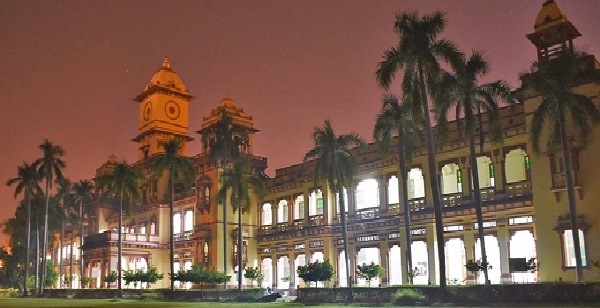GG News Bureau
New Delhi, 18th Feb. The Indian Institute of Technology (IIT) BHU hosted the Inter-college competition Round 3 Grand Finale of Dark Patterns Buster Hackathon (DPBH-2023), which was organized by the Department of Consumer Affairs, Government of India. The Department and the institute worked together to organize the event, with Shri Rohit Kumar Singh, Secretary DoCA, serving as the chief guest.
A national campaign against dark patterns has been effectively mobilized by the innovative project DPBH-2023. In an ongoing effort to combat dishonest online practices, the Department of Consumer Affairs launched a four-round hackathon on October 26, 2023. The goal of the hackathon is to design and prototype cutting-edge software-based solutions, such as mobile applications, browser extensions, plugins, and add-ons, that can identify the kind, frequency, and usage of dark patterns for e-commerce platforms.
By displaying their unmatched talent, students were able to make this event a huge success, and Secretary DoCA, Shri Singh, congratulated them on their unwavering dedication and determination. He praised the participants for coming up with ideas that went above and beyond the stated issue. He claimed that in addition to helping identify dark patterns, the solutions offered by the participants will significantly alter the way that other online deceptive practices—like false reviews, online traps, and deceptive advertising—are regulated. In his closing comments, he underlined how AI can be used to mitigate dark patterns and urged participants to take advantage of new technological advancements while upholding moral standards.
More than 150 colleges joined the DPBH-2023, drawing participation from all over the nation. The fact that more than 40,000 students registered to compete in the intra-college competition as teams of more than 380 demonstrated their zeal and dedication to combating digital deception. More than 172 teams were selected from the competitive pool to move on to the Grand Finale, also known as Round 3, which took place on February 17, 2024, at IIT (BHU).
At the DPBH-2023 Inter-college competition Round 3 Grand Finale, more than 500 students, 150+ subject matter experts, and jury members were present. Every team showcased functional, real-time models that could identify 13 distinct categories of illicit dark patterns, as identified by the Indian government. Among the major innovations that were presented and discussed at the event were the following ones:
Huge Language Models for Identifying Dark Patterns: An amazing project suggested using a browser plugin to identify dark patterns on e-commerce websites. The Large Language Model (LARA), which is based on a 7 billion-parameter model that was created and designed in-house, is optimized with a special dataset and Low-Rank Adaptation (LoRA) to allow for accurate detection by analyzing HTML content that is structured into Resource Description Framework (RDF) using a Document Object Model (DOM) graph.
Serverless Architecture for Real-time Analysis: AWS Lambda and cross-encoder machine learning models are used in some solutions’ serverless setups. Transformer.js allows for multi-lingual analysis, demonstrating scalability and efficiency in recognizing “misdirection” and “forced action.”
Modular Approach for Comprehensive Protection: Several projects have embraced a modular approach that combines You Only Look Once (YOLO) technology and React for real-time use alerts with text and visual analysis. This approach addresses a variety of dark patterns while putting user privacy first.
Mobile and Web Platform Solutions: Some solutions focus on revealing “hidden information” via a user-friendly Flask and React Native platform enhanced by a chatbot to streamline privacy policies, using Random Forest classifiers and Google’s Vision API.
An add-on for browsers to improve transparency: Some browser extensions are using tech stack components like JavaScript, HTML, CSS, and Python to identify “fake reviews” and “false urgency.” They also use machine learning to analyze data and streamline user experience.
These solutions cover a wide range of technologies and methodologies and are designed to address 13 specific dark patterns that the Department of Consumer, in addition to warning consumers about particular dark patterns, they also give the government answers by supplying real-time data and pointing out other kinds of newly emerging dark patterns. These projects directly support the hackathon’s main objective of thwarting dark patterns by aiming to improve digital transparency, empower users, and create a safer online environment.
The DPBH-2023 is evidence of the cooperative efforts of learners, instructors, and business leaders in tackling the pressing problem of dark patterns. The hackathon develops a culture of moral digital behavior in addition to encouraging innovation.
The culmination of this significant event will be the announcement of awards and cash prizes on March 15, 2024, which is World Consumer Rights Day. This day will celebrate the accomplishments of the participants and advance the cause of consumer rights in the digital age.
Additional dignitaries who spoke at the event included Dr. NS Rajput, who is the convener of DPBH-2023 and an associate professor of electronics engineering at IIT(BHU), Professor MK Meshram of the department of electronics engineering at IIT(BHU), Professor Vikas Kumar Dubey, dean of R&D at IIT(BHU), and Shri Anupam Mishra, joint secretary in the department of consumer affairs.


Comments are closed.